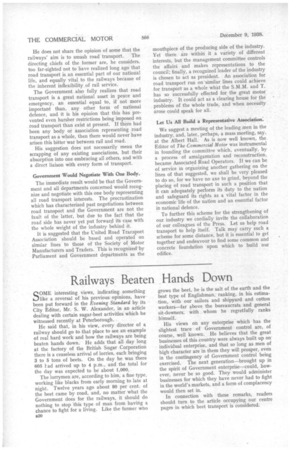Railways Beaten Hands Down
Page 34

If you've noticed an error in this article please click here to report it so we can fix it.
SOME interesting views, indicating something like a reversal of his previous opinions, havebeen put forward in the Evening Standard by its City Editor, Mr. S. W. Alexander, in an article dealing with certain sugar-beet activities which he witnessed recently at Peterborough.
He said that, in his view, .every director of a railway should go to that place to see an example of real hard work and how the railways are being beaten hands down. He adds that all day long at the factory of the British Sugar Corporation there is a ceaseless arrival of lorries, each bringing 3 to 5 tons of beets. On the day he was there 605 lad arrived up to 4 p.m., and the total for the day was expected to be about 1,000.
The lorrymen are, according to him, a fine type, working like blacks from early morning to late at night. Twelve years ago about 80 per cent. of the beet came by road, and, no matter what the Government does for the railways, it should do nothing to stop this type of man from having a chance to fight for a living. Like the fanner who grows the beet, he is the salt of the earth and the best type of Englishman, ranking, in his estimation, with our sailors and shipyard and cotton workers—far above the bureaucrats and general sit-downers, with whom he regretfully ranks himself.
His views on any enterprise which has the slightest trace of Government control are, of course, well known. He believes that the great businesses of this country were always built up on individual enterprise, and that so long as men of high character are in them they will prosper, even in the contingency of Government control being exercised. The next generation—brought up in the spirit of Government enterprise—could, however, never be so good. They would administer businesses for which they have never had to fight in the world's markets, and a form of complacency would then set in.
In connection with these remarks, readers should turn to the article occupying our centre pages in which beet transport is considered.




























































































